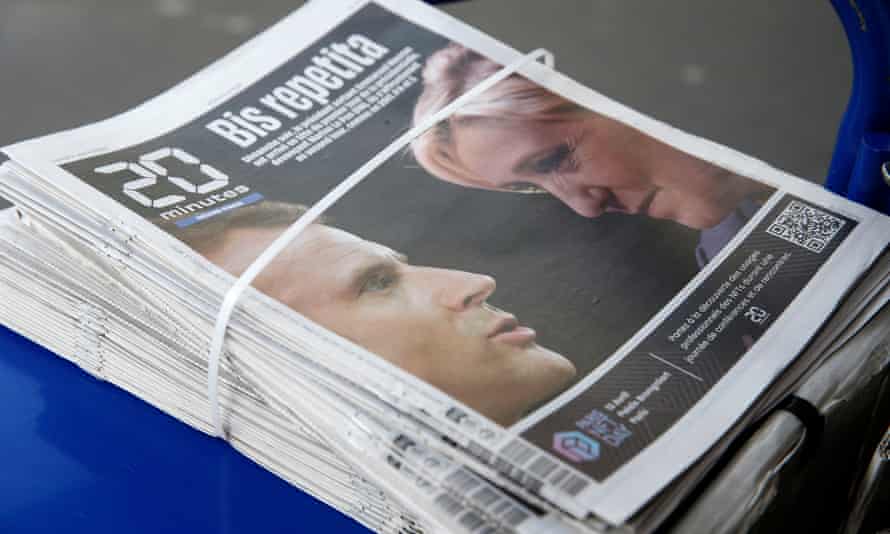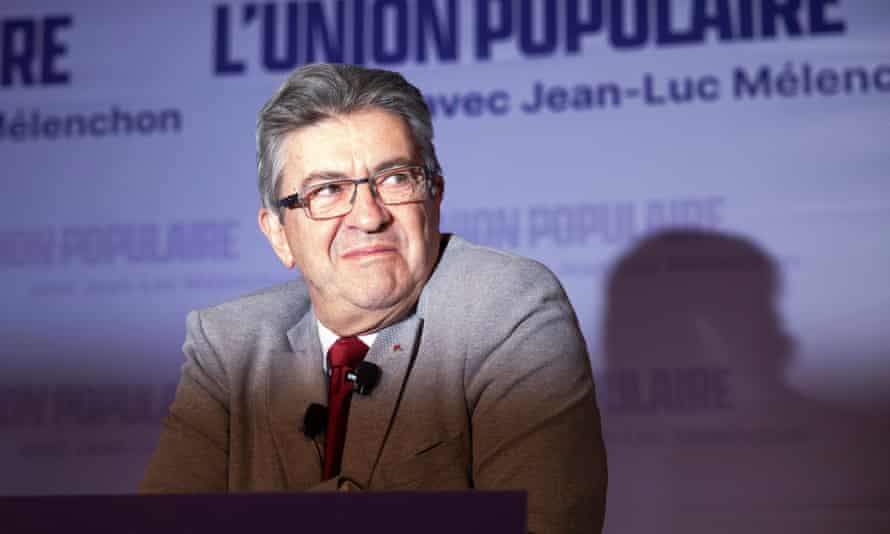The race to run France began again on Monday morning as first-round winners Emmanuel Macron and Marine Le Pen launched their campaigns to win over losing candidates’ supporters before the second-round vote in less than two weeks.
Macron needs to unite a hostile electorate from the political extremes to vote for him on 24 April. With many, particularly on the left, feeling politically orphaned by Sunday’s result, getting them to vote at all will be the first hurdle.
The president emerged with a lead of several points after the first-round ballot, scoring 27.6% against Le Pen’s 23.41%, according to the latest almost complete figures from the French interior ministry. However, the results suggested up to a third of voters chose far-right candidates including Éric Zemmour, and they are likely to transfer their support to Le Pen.
The radical-left candidate Jean-Luc Mélenchon has emerged as kingmaker in third place after he rose to within a few points of Le Pen at just under 22% in a surprising 11th-hour surge. He has advised his supporters not to vote for Le Pen in the second round, but stopped short of advising them to vote for Macron. High abstention in the second round is likely to play in Le Pen’s favour.

The interior minister, Gérald Darmanin, on the right of the president’s governing La République En Marche (LREM) party, cautioned against dismissing the large number of voters who shunned the previous parties of government – namely the Socialist party (PS) and the mainstream-right Les Républicains (LR), both of whose candidates crashed out with less than 5% of the vote.
“The vote for the extremes, particularly that for Madame Le Pen, is effectively also a cry of alarm. Emmanuel Macron is the only one in the republican field to have enough of a score to fight the extremes,” Darmanin told French television.
He said Macron deserved to be praised for his handling of three crises during the last year: the gilets jaunes(yellow vest) movement, Covid and Ukraine.
Macron, who was accused of “arrogance” in leaving his first-round campaigning to the last minute in the belief the election would be a walkover, was expected to visit northern France, a Le Pen stronghold, on Monday morning. He will appear on prime-time French television on Monday evening.
Le Pen’s team said the result was a “failure” for Macron. “In truth, 70% of French people voted against him,” Jordan Bardella, acting head of Le Pen’s National Rally (RN) party.
In the early hours of Monday, there was a brief ray of hope for Mélenchon as the updated count suggested he was closing on Le Pen. In the end, his team conceded defeat. “We believed in it, but we realised in the middle of the night that we wouldn’t be able to catch up,” Adrien Quatennens, an MP for La France Insoumise (LFI) Mélenchon’s party, told France Inter radio.
“We missed by 500,000 votes,” he said.
Quatennens said it was now up to the party to make its mark on the legislative election in June to rob Macron of a parliamentary majority. “We could be that we impose a cohabitation [power-sharing deal] on him,” he said.

Olivier Faure, the first secretary of the Socialist party, admitted the Paris mayor Anne Hidalgo’s score of under 2% was “an immense disappointment”. “It’s a historic defeat … an unusual score for a party that has run the country,” Faure told France Info. Even in Paris, Hidalgo came seventh, just below Le Pen.
A study by the pollsters Ipsos found Macron, 44, who in 2017 became France’s youngest head of state since Napoleon, had his biggest support come from the oldest voters, aged 70 and over, while Mélenchon was most popular among 24-34-year-olds. Le Pen’s greatest score came from 50-59-year-old voters.
The low turnout for the Europe-Ecology-Green party, LR and PS has raised questions about the financial solvency of the parties.
Hours after the result, Yannick Jadot, the Green candidate, appealed for donations to pay outstanding campaign expenses. Jadot is one of several candidates who scored less than 5% of votes and who under election rules will have a maximum of €800,000 (£670,000) of the cost of their election campaign reimbursed by the state. The ecologist, who reportedly borrowed €7m to stand, has about €2m to find to repay the loan before the end of May.
On Monday, Valérie Pécresse, the LR candidate, told journalists the campaign had left the party €7m in debt, €5m of which was a personal loan she had taken out. “The situation is critical. I am launching a national appeal for donations. The survival of the republican right depends on it,” she said.
The crisis will be even more severe for the Socialist party, which sold its famous central Paris headquarters after Benoît Hamon’s drubbing in the 2017 presidential election.

Leave A Comment